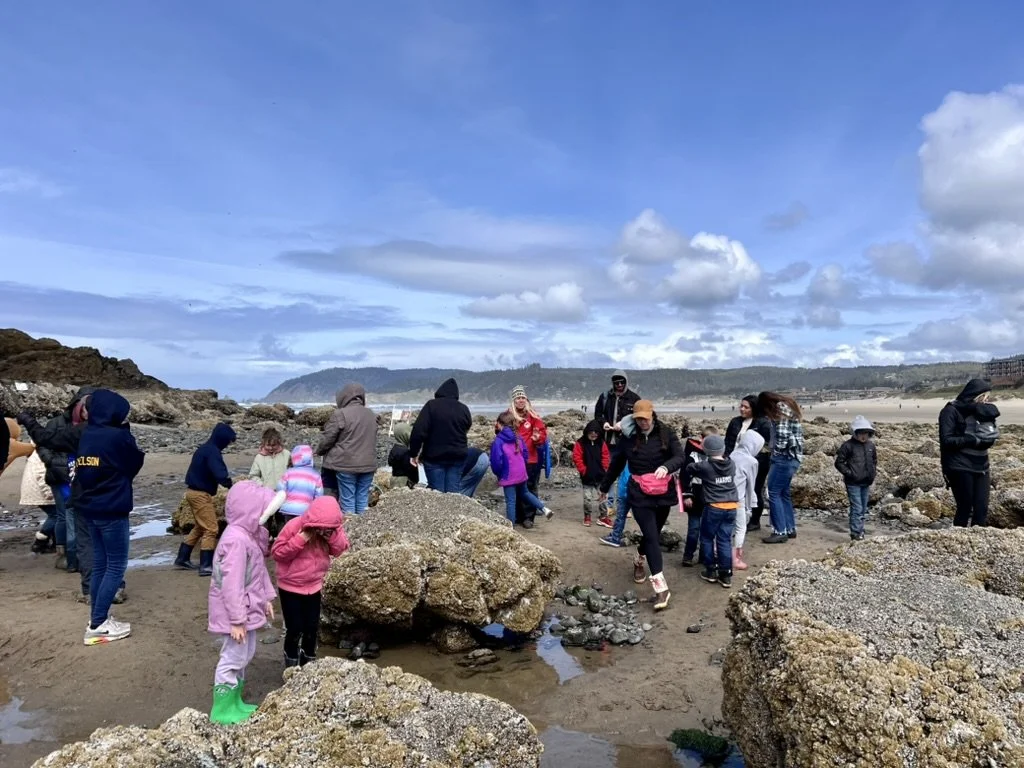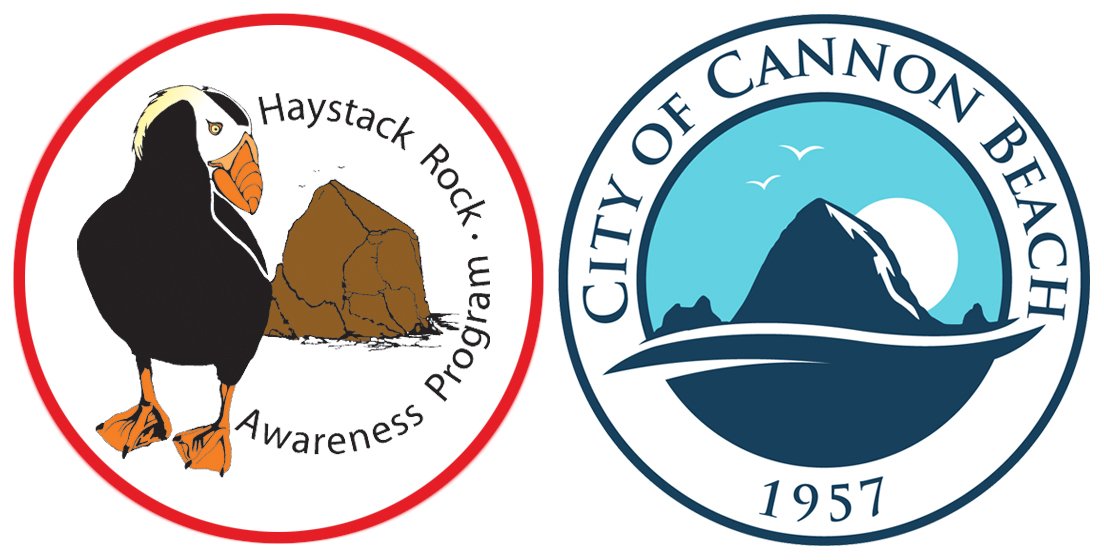











Haystack Rock Awareness Program
Protecting, through education, the intertidal and bird ecology of the Marine Garden and Oregon Islands National Wildlife Refuge at Haystack Rock.
Happenings at Haystack Rock
Our Tufted Puffins left Haystack Rock in August and have departed for the winter, along with the majority of our seabirds. We look forward to welcoming them back when they return next spring, typically in April.
Stay tuned for our special events in 2026!
Today’s Tides
*It’s best to visit during low tide. Find our full schedule here.
Follow Us
To stay up to date with the latest information, news, and interesting facts, be sure to follow us on Facebook and Instagram.

Puffinology 101

We are puffin’ with joy 🎉 we’ve spotted the first tufted puffins of the season!
This morning, our Director and Education and Volunteer Coordinator hit the beach to try and spot the first arrivals 🔎 While none were seen lingering outside of their burrows, they did observe three tufted puffins intermingling with a raft of common murres beyond the waves! Needless to say, we will be keeping our 👀 eyes glued to the Rock for the rest of the week!
At Haystack Rock, the tufted puffin burrows can be spotted in the grassy meadow on the north and western face 🪨
Do 🫵🏼you🫵🏼 want to learn more about these amazing seabird? Be sure to join us at our Puffin Welcome Celebration at Haystack Rock on April 13th from 8 - 12!
📸: Barb and Larry Hauser
📸: Mylasia Miklas | HRAP
#Haystackrockawarenessprogram #Cannonbeach #Haystackrock
#Oregoncoast #PNW #tidepooling #puffins #tuftedpuffins

Common murres (Uria aalge) have been spotted at the rock 🪨 over the past few weeks, which means nesting season 🪺is right around the corner! Historically, they arrive in March to scope out the nesting grounds before settling in April.
Many visitors mistake these seabirds for tufted puffins. While they are similar in size, common murres have a white underbelly and black upper body, whereas the tufted puffins are entirely black!
#Haystackrockawarenessprogram #Cannonbeach #Haystackrock
#Oregoncoast #PNW #commonmurre #seabird #puffins #tuftedpuffins

🌊The rocky intertidal is a beautiful, yet fragile, ecosystem. Before heading out to the pools, be sure to be familiar with tidepool etiquette. Following these guidelines keeps both our marine life and 🫵🏼 YOU 🫵🏼 safe!
💡Know before you go: Many rocky intertidal areas, like Haystack Rock, are protected! Be sure to know the rules and regulations governing the area you intend to explore before heading out
🚶🏻♀️Walk on Sand: Anemones, barnacles, mussels, snails, sea stars, and so much more call these rocks their home. Let’s be good ‘house guests’ by not stepping on them.
🔎Explore carefully: There is so much life in the rocky intertidal to discover. Take it slow - you’re likely to see more and avoid accidental injury. When exploring, look with your eyes and gently with your hands. Avoid poking, prying, kicking, or crushing animals. Only turn over rocks that are the size of your hand. Be sure to place the rock exactly how you found it to keep these spaces hospitable.
🪶Give Wildlife Space: During low tide, many shore birds take the opportunity to forage among the rocks. Be considerate of their needs by giving them ample space.
🐚Avoid Collecting: Everything within the tidepools has a purpose. Empty shells are used by different animals, like hermit crabs.
🚮Pack it in, Pack it out: Refrain from littering and make an effort to pick up debris whenever possible.
#Haystackrockawarenessprogram #Cannonbeach #Haystackrock
#Oregoncoast #PNW #tidepooling #tidepooletiquette #stewardship

Even on the beach, there are signs of spring 🌸 Native to coastal areas of western North America, Hooker’s willow (Salix hookeriana), also known as coastal willow or dune willow, can be found in coastal habitats like beaches, marshes, and bluffs.
🌱 In early spring, specialized flowering structures, known as catkins emerge, often acting as one of the first signs of #spring.
#Haystackrockawarenessprogram #Cannonbeach #Haystackrock
#Oregoncoast #PNW

It's hard to believe it's already been a month since we returned to the rock 🪨 So far, we have braved the wild Oregon coast weather, marveled at amazing tidepool/wildlife sightings, and have engaged with over 3,000 visitors! We can’t wait to ‘sea’ what the rest of the season will bring 🌊!
Be sure to stop by and explore with us ❤️ You can find our beach and event schedule on our website 🔗 link in bio
(P.S. Don't forget! Our annual Puffin Welcome Celebration 🎉 is on April 13th from 8:00 to 12:00 at Haystack Rock!)
1) 📸: Mylasia Miklas | HRAP
2) 📸: Kelli Ennis | HRAP
3) 📸: Jane | HRAP
4) 📸: Jane | HRAP
5) 📸: Michelle | HRAP

